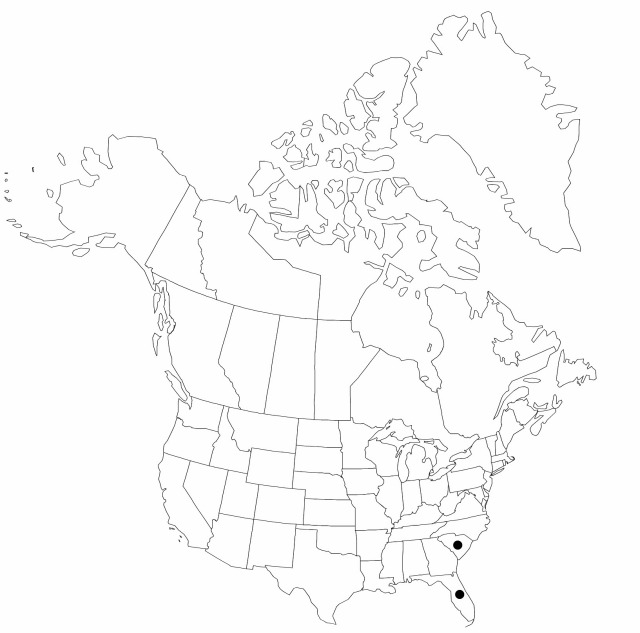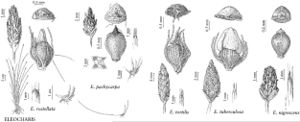Eleocharis nigrescens
Syn. Pl. Glumac. 2: 77. 1854.
Plants usually annual, tufted, not stoloniferous; rhizomes absent. Culms sometimes ascending, subterete, elliptic, or polygonal, (1–)3–7.5(–9) cm × 0.2–0.5 mm, very soft. Leaves: distal leaf sheaths persistent or disintegrating, colorless, stramineous or green, spotted red-brown to purple, membranous, apex narrowly acute. Spikelets: basal spikelets absent; never proliferous, ovoid or ellipsoid, terete, 2–4.7(–8.5) × 1–2 mm, apex acute to blunt; proximal scale empty or with flower, persistent, clasping 1/2 of culm, similar to floral scales (but 1.1–1.7 mm, midrib region broadly green); subproximal scale with a flower; floral scales spiraled, 10–30(–100), 10–16 per mm of rachilla, colorless, whitish, or pale brown, mottled red-brown to purple, midribs pale brown or green, ovate or elliptic, 1–1.2 × 0.45–0.6 mm, membranous, midrib prominent, apex rounded. Flowers: perianth absent; stamens 1; anthers 0.2–0.3 mm; styles 3-fid. Achenes colorless (appearing green-brown from enclosed seed) or whitish, sometimes spotted red-brown, obovoid, trigonous, angles prominent, 0.5–0.6 × 0.33–0.4 mm, apex constricted proximal to tubercle, smooth. Tubercles white, gray or pale brown, pyramidal or umbonate, trigonous, 0.1–0.15 × 0.15–0.2 mm.
Phenology: Fruiting summer–winter.
Habitat: Moist terrestrial sites such as sandy and peaty soils on pond margins, ditches, pine flatwoods
Elevation: 0–30 m
Distribution

Fla., S.C., Mexico, West Indies, Bermuda, South America, Africa.
Discussion
Usually all the floral scales fall from the rachilla at maturity. The achene epidermis is usually translucent, revealing the brown color of the enclosed seed.
Clarification of delimitation of Eleocharis microlepis (Grisebach) D. A. Simpson, E. setifolia, (A. Richard) A. Raynal, and E. nigrescens in the Americas requires further investigation (D. A. Simpson 1988). Specimens from North America treated herein as E. nigrescens seem to agree well with Simpson’s illustration of E. nigrescens; the anther length of 0.2–0.3 mm recorded here is closer to that of E. microlepis. Simpson (pers. comm.) has not examined specimens of either E. nigrescens or E. microlepis from North America, and lists both E. microlepis and E. setifolia from the West Indies and only E. setifolia from South America.
Selected References
None.
